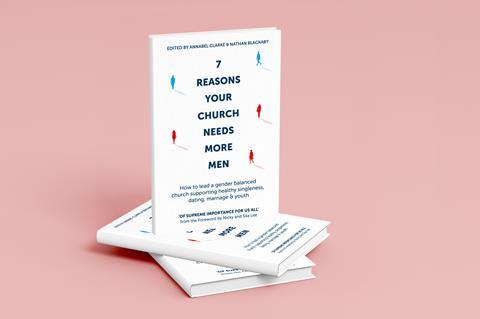The Engage Network is a collaboration of organisations, churches and individuals, with a vision to: “make singleness or marriage a genuine choice for all Christian women and men, through a church which is gender-balanced and teaches about healthy Christian singleness, dating and marriage”. Co-chair Annabel Wheeldon-Clarke explains how the male/female imbalance in Church affects us all

Are you single or married? If someone asked you what impact the Church has had on your situation, what would you say?
There will be all sorts of responses, but there are some key issues that impact us all. You could say they’re a bit like an iceberg, as some are visible (to some people), and some are not so visible. And yet under the surface, often un-noticed or noticed-but-ignored, these issues are massively hitting our lives, families and churches in a crisis situation.
I once got a special invite to my friend Beth’s book club. The gathering was a real range of great women in different life situations. They’d come together to read a book which, despite their differences, addressed big issues affecting each one of them. And at the heart of things was one key fact: there are far more women than men in the Church.
The sobering statistics
Almost all church denominations have a ratio of men to women of 1:2 or 2:3. The imbalance of male and female is present across all age groups – it’s not just about older women living longer than men. In the majority of the Church (the middle-class sector), there are up to 3.4 times the number of unpartnered women to men.
This has huge consequences for all Christians. Firstly, it is clear that we need to do something differently so men have equal opportunities as women to effectively hear the gospel and grow in faith. Secondly, we need to do something differently so that Christian women have equal opportunities as men to marry someone who shares their faith. Currently, this isn’t possible for up to half a million Christian women, who face a decision: marry a non-Christian or stay single and childless. Of course, if women choose to be single for healthy and biblical reasons, the Church must ensure they’re fully supported in that choice. Thirdly, there are profoundly significant intergenerational implications for children, young people and families. If current trends continue, in two generations’ time, guess how many of today’s Church’s grandchildren will have two Christian parents? Only 16 per cent.
Sharing women’s stories
Beth’s book club was getting together to discuss a book called 7 Reasons Your Church Needs More Men: How to lead a gender-balanced church, with healthy singleness, dating, marriage and youth, which was put together by The Engage Network.
During the course of the evening, I got to know a bit more about the women (their stories are all real, though names have been changed here).
Becca is single and lives life to the full. For emotionally healthy reasons she is choosing to be single. Becca feels that her church doesn’t really value, understand or include her. Research shows that one in three church adults are single (one for every couple), and the majority of these report the same experience of church as Becca.
Amy is single, but would love to get married to a Christian guy one day. Despite being sociable, spiritually mature and actively involved in local ministry, she knows hardly any single men who share her faith and might be suitable life partners (and she’s not ‘being too fussy’). Amy is doing the right things and being proactive in meeting new people, including using Christian Connection dating website and SALT dating app. Although it’s sometimes exhausting and demoralising as the years go by (and she would really love to have children), she keeps going – praying and hoping. We know that over half (54 per cent) of single adult Christians say they haven’t dated for at least a year. Like for many in her situation, unwanted singleness is the biggest test of Amy’s faith – the Church is causing significant emotional and spiritual damage to many of her peers.
The Church is causing significant emotional and spiritual damage to many
Kate is married to a non-Christian with two Christian daughters. If she could have found and married someone who shared her faith, she would have loved that, but she longs and prays for her lovely husband to know the Lord. She is so grateful that her girls are part of church, but also really wants them to have the option of getting married to a Christian man when they’re older, if they want to. She’s knows that women in the Church are twice as likely to marry a non-Christian than men, and understands why.
Jane waited until her late 50s, and then married a Christian widower. She had to go through the sometimes excruciating process of grieving the loss of not being able to have children. That loss is almost never recognised in single people’s lives. It’s not the same as having your own family, but Jane is really grateful to have a life partner, and other children in her life.
Sarah’s husband left her for another woman in another country. She is parenting three sons, and doing her best to bring them up to understand and follow God’s ways of doing relationships. She wants them to have male role models at church, but it’s not easy to get to know people enough to facilitate that. She’s wondering if the time might have come for her to start dating again, and is thinking about the limited options, and the potential challenges and joys of blended families.
Sue has Christian ‘kids’ in their 20s whom she’s praying for, and said they experience all the same dating and relationships issues that Amy was sharing about. She said she’s aware that her male church leader got married and had children at a young age, and so doesn’t really understand how church can be experienced by non-Christian men, or how to reach them, or how the lack of men in church affects Christian women and children.
Biblical teaching
Biblically, both singleness and marriage are good. Single people are equally made in the image of God, valuable and competent as married people. At the same time, God’s design from the start has been for marriage to reflect his covenant relationship with the Church, to be foundational to society, and to be personally experienced by most people.
Paul talks in 1 Corinthians 7 about their context being “a present crisis” (v26) and advocates for both healthy singleness (which was freeing in a culture that expected everyone to marry), and marriage (if people want to). There is a theme of ‘choice’. Our context now is that there are unprecedented numbers of single people in society and the Church due to reducing marriage rates, increasing family breakdown rates, the Church gender imbalance and other factors. The situation is often over-spiritualised for Christians who are just told that if they’re single, they must have the ‘gift of singleness’, whether they want it or not, which isn’t helpful.
Obviously one spouse might become a Christian after their marriage, but most Christians would agree that it’s best for a Christian to marry another Christian. They may point to biblical teaching on this (1 Corinthians 7; 2 Corinthians 6:14), or research showing that over 90 per cent of Christian couples expressed happiness with their marriage, while only 66 per cent of those in a mixed marriage did so . We also know that most single Christians want to marry another Christian.
New resource
The Engage Network is highlighting both the issues and solutions around the Church not reflecting the balance God gave in creation. All the people involved in Engage donate their time and book proceeds to the ministry. It’s all only about building the kingdom in a healthy way.
But we really need your help!
We would love for all women, men and churches to get behind the Engage vision and what God is doing to make it possible. Do share the handbook with your friends and church leaders. Pray about all the ideas relevant for your life, family and church.
Another resource that we’re delighted to be launching this year is the Engage Relationally Healthy Church Audit. It’s a practical audit and action process covering some key aspects of relationships, including the areas in the resource book. It’s a framework that helps you identify your church’s strengths and build on these, with manageable practical steps, to help the whole church family flourish. It’s also recognition of your best practice, from respected organisations, and lets people know you understand and are addressing the issues and solutions that affect them. Does your church want to help strengthen evangelism, discipleship, relationships, connection and belonging? This audit can help.
You can be involved in this process whatever your role in church. It’s a teamwork approach with different people helping with different areas of focus. Maybe your role is to pray and share about the audit with your church leaders and others? Maybe it’s to coordinate a team? Maybe it’s to share about this article?
Biblically, both singleness and marriage are good
Imagine if the Church across our nation was baptising an increasing and equal number of men and women, boys and girls, single and married, who were all supporting each other in doing life and relationships God’s way.
God has a part for you to play in this. Will you ask him what that is, and then act? Let’s be part of the change together!

Ways to get involved
We’d love all Woman Alive readers and their friends and churches to join in with building a relationally healthy church, with an equal number of women and men.
Here’s what you can do to make a difference:
1. Pray about all the issues, and for God to change things.
2. Check out the resources on the Engage Network website.
3. Get our resource handbook, 7 Reasons Your Church Needs More Men, share it with your church leaders, friends and family, and use the encouraging tips relevant for your life and situation. It looks at issues in seven key areas relating to men, women, children and young people, singleness, dating and relationships, marriage and parenting/youthwork.
4. Encourage your church leadership to be part of the Engage relationally healthy church audit process, and be part of the audit teamwork for an area you’re passionate about.
5. Give – please consider supporting Engage financially, as it’s a voluntary network run on a shoestring.
6. Get in touch via our website and social media – we’d really love to hear your stories.
Annabel Wheeldon-Clarke is a chartered psychologist and co-chair of The Engage Network You can email her via info@engage-mcmp.org.uk
Find out more on the Engage Network website: engage-mcmp.org.uk




























No comments yet